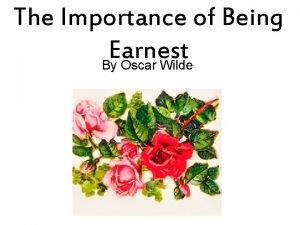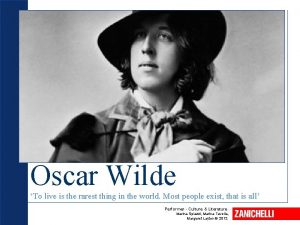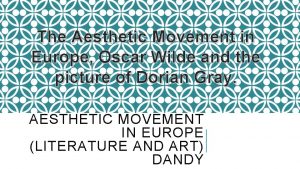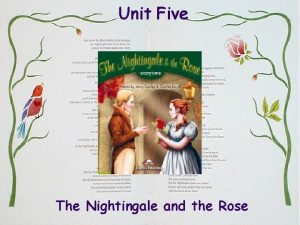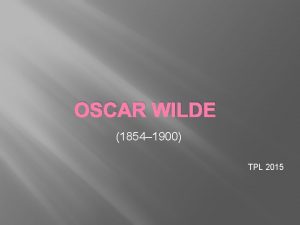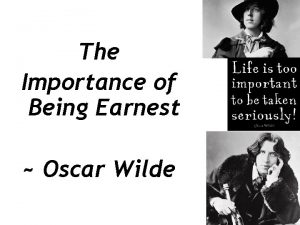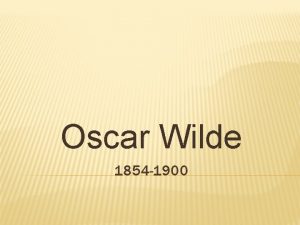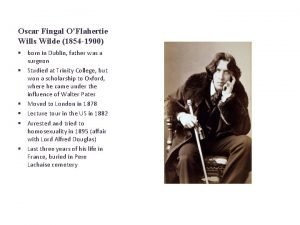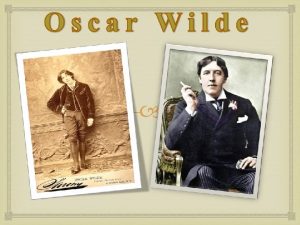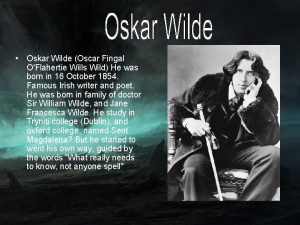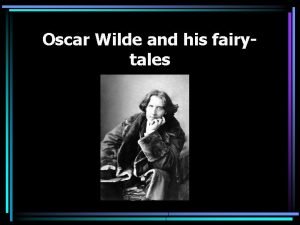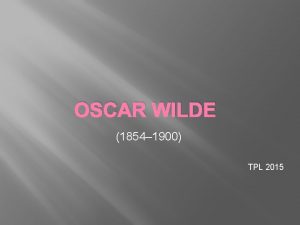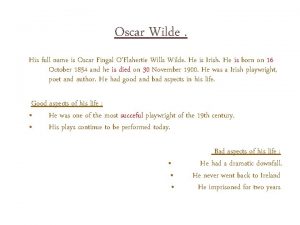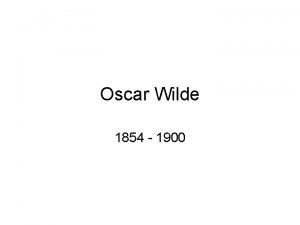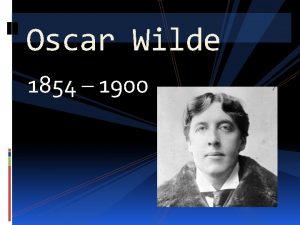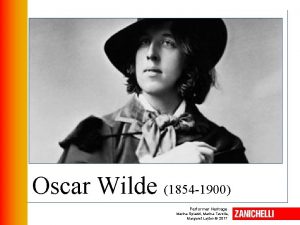Oscar Fingal OFlahertie Wills Wilde 1854 1900 Oscar














- Slides: 14

Oscar Fingal O’Flahertie Wills Wilde (1854 -1900)

• Oscar Wilde, celebrated playwright and literary provocateur, was born in Dublin on October 16, 1854. • He was educated at Trinity College, Dublin and Magdalen College, Oxford. During his days at Dublin and Oxford, he developed a set of attitudes and postures for which he would eventually become famous. • After a stunning performance in college, Wilde settled in London in 1878, where he moved in circles that included Lillie Langtry, the novelists Henry James and George Moore, and the young William Butler Yeats.

• Oscar Wilde's rich and dramatic portrayals of the human condition came during the height of the prosperity that swept through London in the Victorian Era of the late 19 th century. • At a time when all citizens of Britain were finally able to embrace literature the wealthy and educated could only once afford, Wilde wrote many short stories, plays and poems that continue to inspire millions around the world.

• Literary and artistic acclaim were slow in coming to Wilde. In 1884, when he married Constance Lloyd, Wilde’s writing career was still a work in progress. • He had gone on a lecture tour of North America and been lampooned in the 1881 Gilbert and Sullivan operetta Patience as the self-consciously idiosyncratic philosopher-poet Reginald Bunthorne, but he was celebrated chiefly as a well-known personality and a wit. • He may have been the first person ever to become famous for being famous. .

• During the late 1880 s, Wilde wrote reviews, edited a women’s magazine, and published a volume of poetry and one of children’s stories. • In 1891, his only novel, The Picture of Dorian Gray, appeared and was attacked as scandalous and immoral. • In that same year, he met Lord Alfred Douglas, who would eventually become his lover, and Wilde finally hit his literary stride. • Over the next few years, he wrote four plays: Lady Windermere’s Fan, A Woman of No Importance, An Ideal Husband, and The Importance of Being Earnest

• Lady Windermere’s Fan and A Woman of No Importance enjoyed successful runs in the West End in 1892 and 1893, respectively. An Ideal Husband opened in January 1895, but it was The Importance of Being Earnest, which opened a month later, that is regarded by many as Oscar Wilde’s masterpiece. • Its first performance at the St. James’s Theater on February 14, 1895 came at the height of Wilde’s success as a popular dramatist. Wilde was finally the darling of London society, a position he had striven for years to attain.

• In many ways, The Importance of Being Earnest was an artistic breakthrough for Wilde, something between self-parody and a deceptively flippant commentary on the dramatic genre in which Wilde had already had so much success. • Wilde’s genre of choice was the Victorian melodrama, or “sentimental comedy, ” derived from the French variety of “wellmade play” popularized by Scribe and Sardou. • In such plays, fallen women and abandoned children of uncertain parentage figure prominently, letters cross and recross the stage, and dark secrets from the past rise to threaten the happiness of seemingly respectable, well-meaning characters. • In Wilde’s hands, the form of Victorian melodrama became something else entirely. • Wilde introduced a new character to the genre, the figure of the “dandy” (a man who pays excessive attention to his appearance). This figure added a moral texture the form had never before possessed.

• The Importance of Being Earnest was an early experiment in Victorian melodrama. Part satire, part comedy of manners, and part intellectual farce, this play seems to have nothing at stake because the world it presents is so blatantly and ostentatiously artificial. • Below the surface of the light, brittle comedy, however, is a serious subtext that takes aim at self-righteous moralism and hypocrisy, the very aspects of Victorian society that would, in part, bring about Wilde’s downfall.

• Wilde may have remained in England for a number of reasons, including self-destructiveness, denial, desperation, and a desire for martyrdom. • However, some historians have suggested that Wilde’s relentless persecution by the government was a diversionary tactic. • Lord Alfred’s older brother was reportedly also having a homosexual affair with Archibald Philip Primrose, Lord Rosebery, the man who would become prime minister. Queensberry was apparently so outraged that he threatened to disclose the relationship, and the government reacted by punishing Wilde and his lover in an effort to assuage the marquess. In any case, Wilde served his full sentence under conditions of utmost hardship and cruelty.

• His release from prison, his health and spirit broken, he sought exile in France, where he lived out the last two years of his life in poverty and obscurity under an assumed name. • He died in Paris in 1900.

• For sixty or seventy years after Wilde’s death, critics and audiences regarded. The Importance of Being Earnest as a delightful but utterly frivolous and superficial comedy, a view that partly reflects the mindset of a period in which homosexuality remained a guarded topic. • The decriminalization of homosexuality in England in 1967 and the emergence in American of an interest in gay culture, and particularly in the covert homosexual literature of the past, has made it possible to view the play in a different light.

The Importance of Being Earnest • The Importance of Being Earnest, is a play by Oscar Wilde. First performed on 14 February 1895 at St. James's Theatre in London, it is a farcical comedy in which the protagonists maintain fictitious personae in order to escape burdensome obligations. Working within the social conventions of late Victorian London, the play's major themes are the triviality with which it treats institutions as serious as marriage, and the resulting satire of Victorian ways. Contemporary reviews all praised the play's humour, though some were cautious about its explicit lack of social messages, while others foresaw the modern consensus that it was the culmination of Wilde's artistic career so far. Its high farce and witty dialogue have helped make The Importance of Being Earnest , Wilde's most enduringly popular play.

• It’s plot is difficult to explain. But the title explains everything. “Earnest” means serious but it prononunced same as “Ernest”. It meant as a double-entendre. The protagonist, called Jack in the country and Ernest in town, is chasing a young lady who will only marry a man named Ernest because she desires the quality of being earnest above all others in her future husband. The play's second half revolves around attempts by not one but two characters to be christened officially with that same name as part of their frenzied skirt-chasing.

LITERARY WORKS 1878 Ravenna 1881 Poems 1888 The Happy Prince and Other Tales 1889 The Decay of Lying 1891 The Picture of Dorian Gray 1891 Lord Arthur Savile’s Crime and Other Stories 1891 Intentions 1891 Salome 1892 The House of Pomegranates 1892 Lady Windermere’s Fan 1893 A Woman of No Importance 1893 The Duchess of Padua 1894 The Sphinx 1895 An Ideal Husband 1895 The Importance of Being Earnest 1898 The Ballad of Reading Gaol
 Pinkerton's stain remover
Pinkerton's stain remover Dr. frederick chasuble
Dr. frederick chasuble Oscar wilde sebični div
Oscar wilde sebični div Selfish giant summary
Selfish giant summary Escolho meus amigos
Escolho meus amigos El genio irlandes
El genio irlandes Oscar wilde zanichelli
Oscar wilde zanichelli Aesthetic movement oscar wilde
Aesthetic movement oscar wilde Aestheticism oscar wilde
Aestheticism oscar wilde The nightingale and the rose summary
The nightingale and the rose summary The selfish giant plot diagram
The selfish giant plot diagram Oscar wilde ernest
Oscar wilde ernest Oscar wilde monument
Oscar wilde monument Themes importance of being earnest
Themes importance of being earnest Dorian grey effect
Dorian grey effect

